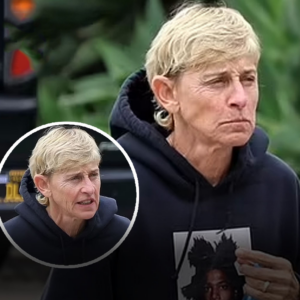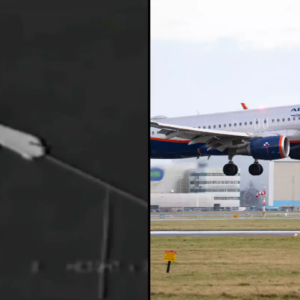German Forces Captured Stalin’s Son, Stalin Didn’t Care – He Despised Him
Nazi forces captured Stalin’s son, Yakov Dzhugashvili. When the Nazis proposed exchanging him for their captured field marshal Friedrich Paulus, Stalin retorted “I will not trade a marshal for a lieutenant.” Dzhugashvili was later executed in 1943.
On June 22, 1941, the much awaited and planned invasion of the Soviet Union began. The Nazi military juggernaut hurled the full force of the Wehrmacht at the Red Army in a maneuver that was called Operation Barbarossa. At the time, it was the most extensive single military action in the history of humankind.
It was a daring exploit that involved the use of over three thousand tanks, three million German soldiers in 150 divisions and further reinforcements from the Italians, Romanians, and Fins. The Germans were at the apogee of their military might in terms of tactics, training, moral and equipment.
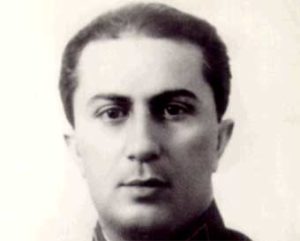
Yakov, Joseph Stalin’s eldest son
The moment the Germans crossed the border, the Soviet resistance withered away in the face of such a superior force – for a while, it seemed that another Blitzkrieg was in the making and that all of Russia would topple in imitation of brave Poland and France in the years 1939 and 1940 respectively.
In the first weeks after crossing the Soviet-German border, the Wehrmacht captured Millions of Red Army soldiers – among them a man called Yakov Dzhugashvili. He would spend the rest of his life in German captivity until 1943 when he died in the Sachsenhausen concentration camp.
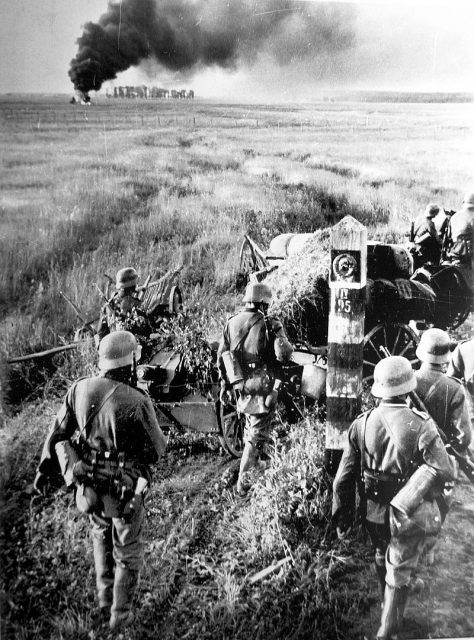
German troops at the Soviet state border marker, 22 June 1941
Joseph Goebbels was in seventh heaven – Hitler’s outspoken mouthpiece, who always had something to say, shared his elation with some of his best propaganda material yet. “Complete cluelessness prevailed in the Red Army,” announced the German Propaganda Minister from the interrogation protocol of the prisoner of war named Yakov Dzhugashvili.
It continued, “The Soviet troops were badly organized and lamentable – unwise, stupid, even idiotic as the generals sent their units straight into the fire and into death.”
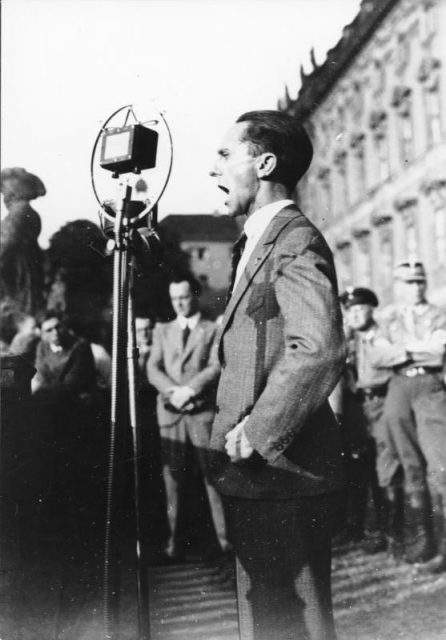
Goebbels speaks at a political rally (1932). Photo: Bundesarchiv, Bild 119-2406-01 / CC-BY-SA 3.0
The man called Yakov Dzhugashvili, who was captured by the Germans at Smolensk, could have been better known by the surname Stalin. His father was no less than the Soviet leader himself.
As soon as this news spread, the highly efficient Nazi propaganda apparatus was running at full speed. Broadcasters spread the word of the interrogation record in Russian to damage moral and to convince soldiers in the Red Army to defect. The German Luftwaffe dropped thousands of leaflets across the Soviet lines with photographs depicting Stalin’s son surrounded by German officers.
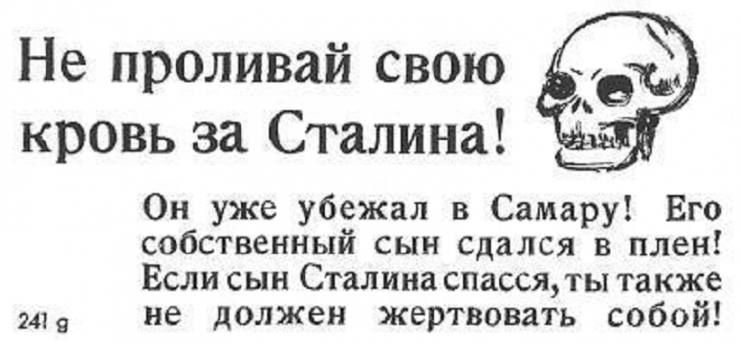
German propaganda 1941. “Do not shed your blood for Stalin! He has already fled to Samara! His own son has surrendered! If Stalin’s son has saved himself, then you are not obliged to sacrifice yourself either!”
Daughter arrested, granddaughter sent to a home
Meanwhile, in Moscow, the despot, Stalin, had his daughter-in-law Julia suffer on behalf of her husband. She was immediately arrested, and her and Yakov’s daughter interned in a home. Stalin always made short work of traitors – just like with his firstborn son.
Who was Yakov Dzhugashvili exactly?
To put it bluntly, he was somebody his father did not like very much. Father and son never got along. Stalin allegedly once referred to his son as a mere cobbler.
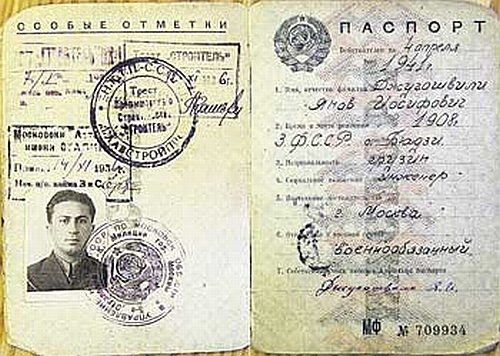
Yakov jugashvili passport
Yakov was born in 1907 as the eldest of his four children and the result of the union between the soon to be autocratic Soviet dictator and his first wife, Ekaterina Svanidze, who died a few months after giving birth.
Stalin lamented to his biographer, Simon Sebag Montefiore, at the funeral of his wife, who was the love of his life: “With her, my last warm feelings for all human beings have died.” And without further ado, he coldly left his son to be raised by relatives.
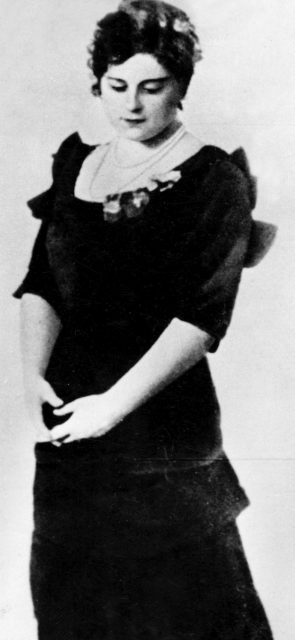
Ekaterina Svanidze, (1880-1907), first wife of Joseph Stalin
Yakov’s maternal uncle raised him. It was from his uncle that he got the inspiration to seek out higher education and leave his native Georgia for Moscow. He soon learned Russian (his native tongue was Georgian) and eventually graduated from the military academy.
The relationship between father and son was always a contentious one. However, the straw that broke the camel’s back was when Yakov started living with Zoya Gunina, the daughter of an Orthodox priest. An incensed Stalin never forgave his son and refused to accept the young woman, who had been a former classmate of a young Yakov.
The tension became too great for Yakov that the deeply hurt young man attempted to commit suicide. However, in this endeavor he also disappointed his father when the bullet merely pierced his lung, missing the heart. This action prompted the famous but hurtful words by Joseph Stalin, “You couldn’t even do this properly.”
On the outside, father and son resembled each other, but on the inside, they could not be more different. While Stalin was brutal and calculating, Yakov’s half-sister, Swetlana, described her brother as “peaceful,” “quiet,” and “modest.”

Stalin carrying his daughter, Svetlana
While his father climbed to new and insurmountable heights in the Soviet Politburo, Yakov, without any patronage from his powerful father, attempted to establish his own existence. He became an engineer and worked in a Moscow automobile plant, which was of course named after his almighty father.
Only when Yakov entered the Red Army did Stalin seem to start to respect him. At the beginning of May 1941, Yakov received his first command. He was put in charge of a howitzer unit. A few weeks later, the Germans invaded.
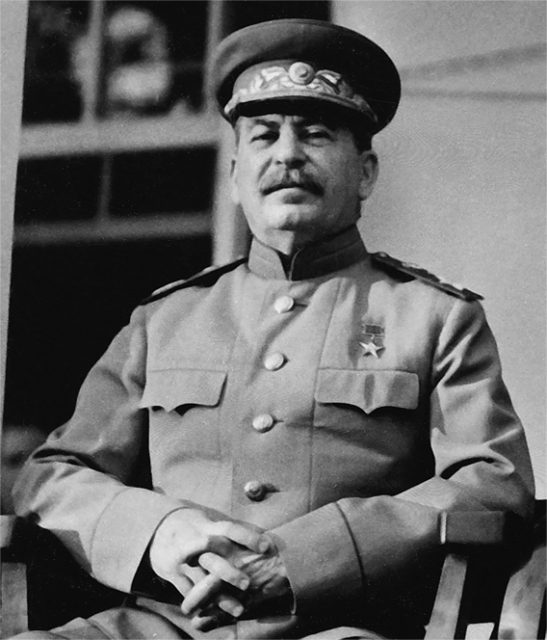
J. Stalin in 1943
“Go and fight,” the dictator ordered his son by phone after the invasion began. On July 9, 1941, one of Yakov’s commanding officers attested to his bravery, but five days later he was reported missing.
Joseph Stalin considered his son’s capture an act of treason
“He did not even manage to shoot himself,” Stalin supposedly commented in response to the German announcement of his son’s capture. However, at the same time, he categorically banned combat missions for his other son, Vasily, an Air Force officer.

Stalin with Vasily , his son from his second marriage
“Getting captured by the enemy is the same as treason,” were the words Red Army soldiers repeated when they were sworn in. The supreme dictator thought of all prisoners of war as traitors, and this distinction included all of his relatives as well.
In particular, ‘Command 270,’ which was issued soon after the commencement of the Nazi invasion of the Soviet Union, that threatened every Red Army officer, who was imprisoned, a certain death should he ever return home. The threat extended to the officers’ families that could be arrested and placed into forced labor camps, often with no government support.

Heinrich Himmler visiting a Prisoner of War camp during World War 2. The prisoner is claimed by some to be British soldier, Horace Greasley.
The joke is that based on his orders, Stalin should have had himself arrested too because of Yakov’s capture. Instead, he quickly laid the blame on his daughter-in-law and sent her to prison.It is just as George Orwell wrote in his book ‘Animal Farm:’ “All animals are equal, but some animals are more equal than others.”
Yakov spent the next two years in German POW camps: first in Frankish Hammelburg, then near Lubeck, and finally in the Sachsenhausen concentration camp near Berlin. It was here that important prisoners of war were housed from various nationalities: British, Russians, Greeks, and in addition to Stalin’s son, a nephew of the Soviet Foreign Minister, Vyacheslav Molotov.
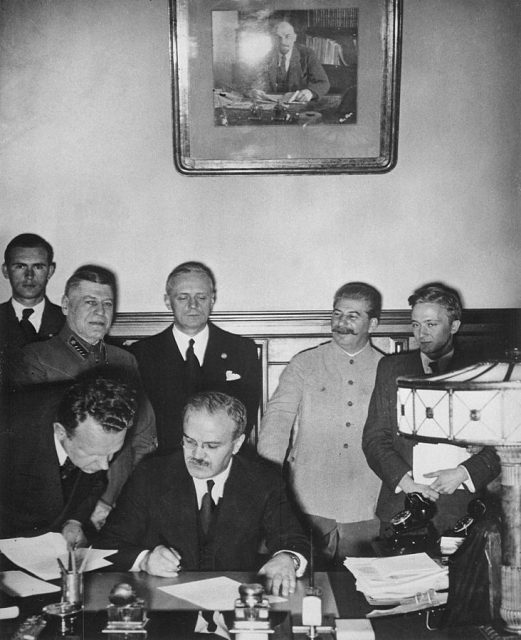
Vyacheslav Molotov signs the Molotov-Ribbentrop Pact, a German–Soviet non-aggression pact, August 23, 1939.
During this period, it was even reported that the Germans offered to trade Yakov for a high-ranking German officer held in Soviet captivity. Some say it was Field Marshal Friedrich von Paulus after his surrender in Stalingrad on February 2, 1943. It did not matter because Stalin adamantly refused any deal. He even went so far as to claim that he had no son in German captivity.
And as the title of this article suggests, it was even rumored that Stalin said the following, “I will not trade a marshal for a lieutenant.”
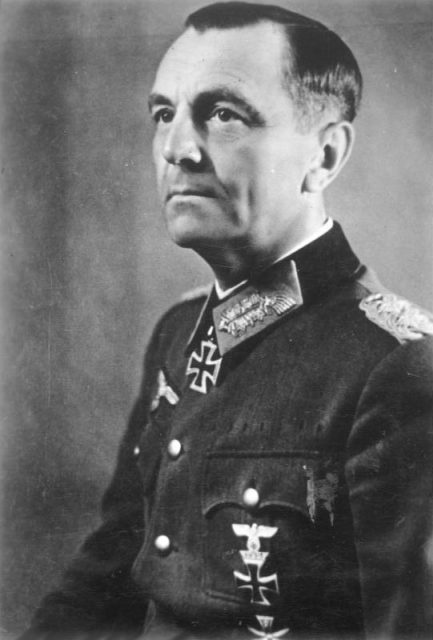
Friedrich Paulus Photo by Bundesarchiv, Bild 183-B24575 / Mittelstaedt, Heinz / CC-BY-SA 3.0
If only Stalin had made the exchange
Life at Sachsenhausen was tough, as one might imagine. There was a small area, surrounded by a high electrically charged fence, in which the inmates were allowed to move freely.
Yakov Dzhugashvili continued to wear his Soviet uniform and to some extent, due to his importance, had a better life than his fellow captives. He received SS food and was able to wash regularly. As a result, Stalin’s son remained physically healthy, but it is claimed that he most probably suffered from quite severe depression.

Prisoners of Sachsenhausen
“While we marched to keep ourselves fit, he just wandered around,” said fellow inmate Thomas ‘Red’ Cushing, a fellow POV from Britain.
Cushing also claimed that Yakov grew increasingly truculent as time went by. He shared hut A with Wasili Kokorin, the Soviet foreign minister’s nephew we mentioned earlier, and four British POWs, Sergeant Cushing, William Murphy, Andrew Walsh, and Patrick O’Brien. Cushing was the only member of the British party who lived long enough to tell the tale.
“It was a terrible place, but we survived,” said Cushing.
Cushing also explained that the atmosphere deteriorated when the British POWs suspected that Wasili Kokorin, a small egotistical man, was acting on behalf of the Nazi guards. Furthermore, the Russians provoked the British by saying that they were cowards and that the Soviets would soon overrun all of Western Europe when the Germans were defeated.

Sachsenhausen,
The atmosphere was toxic. It got so bad, in fact, that a fight broke out between the Russians and the British concerning the lavatories. The latter accused the Russians of deliberately befouling the loos.
On April 14, 1943, it became too much for Yakov who had been on the cusp of breaking down the entire time. According to a young SS soldier, he all of a sudden turned completely insane and ran through the camp yelling to the guards to shoot him down. He refused all orders.
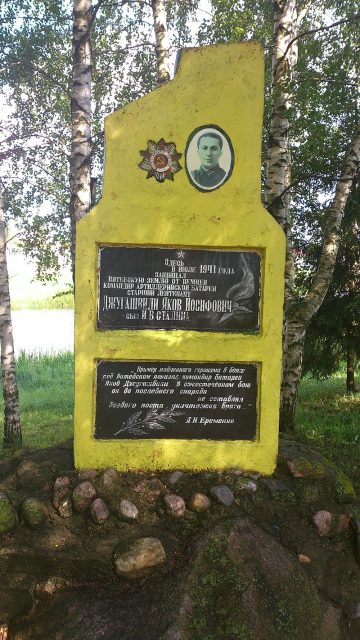
Photo by Нирваньчик –
CC BY-SA 4.0
SS officer Konrad Hartich, who was on duty at the time, said the following:
“He (Jakov) put one leg over the trip-wire, crossed the neutral zone and put one foot into the barbed wire entanglement. At the same time, he grabbed an insulator with his left hand. Then he let go of it and grabbed the electrified fence. He stood still for a moment with his right leg back, and his chest pushed out and shouted to me ‘Guard, you are a soldier, don’t be a coward, shoot me.’”
In the end, Hartich fired. The single shot penetrated Stalin’s son’s head four centimeters in front of the right ear – Yakov died immediately.
A few days later, SS Reichsführer Heinrich Himmler wrote to Foreign Minister Joachim von Ribbentrop: “Dear Ribbentrop, I am sending you a report pertaining to the POW, Yakov Dzhugashvili, son of Stalin, who was shot during an escape attempt in Sonderlager A in Sachsenhausen near Oranienburg.”
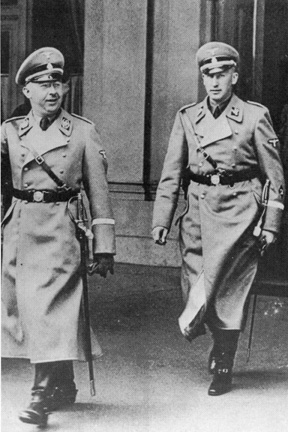
Heinrich Himmler and Reinhard Heydrich.
According to Thomas Cushing, Yakov had listened to a German propaganda broadcast on the radio and it rendered him completely distraught. Apparently, Stalin was quoted as saying: “Hitler has no Russian prisoners at all, he has only Russian traitors, and once the war is over we will take care of them. I have no son called Yakov.”
Yakov had no illusions about what his father was. He knew that after the war he would be executed. That radio broadcast and the fact that he was at constant loggerheads with his fellow inmates possibly drove him over the edge. We cannot be sure. All we can do is trust the sources and the eyewitness accounts as best we can.
Yakov’s father never knew of the full extent around his son’s death because it was deemed distasteful by the British to propagate the alleged quarrels between the Russians and their British allies during captivity. They decided to keep the information they found concerning Yakov Dzhugashvili’s death a secret.
News
The “Red Zone” – Land Still Abandoned Due to the Dangers Left by the First World War
The “Red Zone” – Land Still Abandoned Due to the Dangers Left by the First World War In the aftermath of the First World War, large areas of northeast France were left in ruin. Years of constant siege warfare along…
Before Becoming a Big-Name Actor, Richard Todd was a Paratrooper Who Fought at Pegasus Bridge
Before Becoming a Big-Name Actor, Richard Todd was a Paratrooper Who Fought at Pegasus Bridge Photo Credit: 1. Sgt. Christie, No. 5 Army Film & Photographic Unit / Imperial War Museums / Wikimedia Commons / Public Domain 2. Silver Screen…
The Potsdam Giants: A Prussian Infantry Regiment Of Nothing But Very Tall Soldiers
The Potsdam Giants: A Prussian Infantry Regiment Of Nothing But Very Tall Soldiers Frederick William I inspecting his giant guards known as The Potsdam Giants, a Prussian infantry regiment No 6, composed of taller-than-average soldiers. Frederick William I of Prussia,…
Ellen DeGeneres cuts a very casual figure as she drives around in her Ferrari
Ellen DeGeneres cuts a very casual figure as she drives around Montecito in her Ferrari… while preparing to embark on her stand-up tour Ellen DeGeneres cut a very casual figure as she made her way around Montecito on Tuesday morning. The…
“I’m heavily tattooed and keep getting rejected for jobs – it’s not fair”
Heavily tattooed OnlyFans star, 23, with multiple piercings on her FACE slams TJ Maxx for rejecting her for a job – accusing retailer of unfairly judging her dramatic look A woman has accused TJ Maxx of rejecting her for a…
All 75 passengers killed in plane crash after pilot let his chirldren control the plane
Praying, turning the engine off by accident and letting KIDS play with the controls: The worst blunders made by pilots before a crash revealed Every time we board a plane, we put our lives in the hands of the pilot….
End of content
No more pages to load



